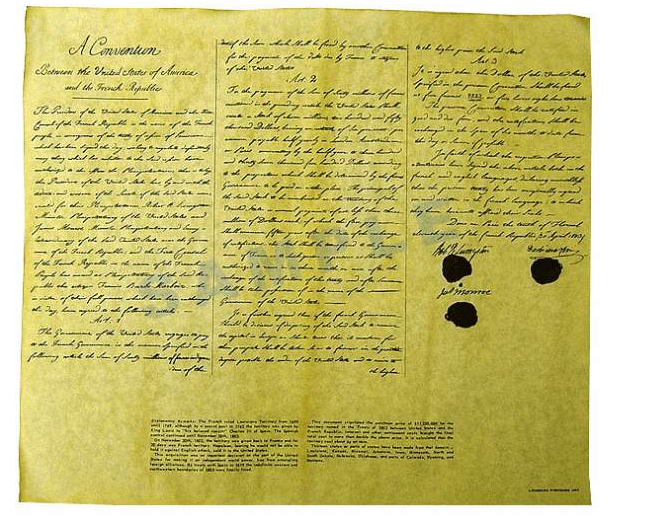Writing from the Midwest…last month is memorable because: 1) the good people at GovLoop invited me to guest blog, and I am honored; 2) I joined Medicare Nation, and I wonder how that happened; and 3) I saw some of the founding, public documents important to history as I know it, and I have goose bumps.
Thank you, National Archives, for sending the Louisiana Purchase Treaty to the Missouri History Museum in St. Louis. It’s written in French and it’s under glass. But being a latter-day witness to this 1803 document is a bit of time travel. Think of our national leaders contemplating 828,000 square miles for $15 million…so much land, so cheap, and what a great location!
Just a few days later, I held in my hands the ORIGINAL Columbia, Missouri Town Board minutes from 1826 – 1835. The minutes are written in English, in an extravagant hand, all flowy brown ink bleeding through old pages. They are held by the State Historical Society of Missouri and represent the hunger for westward expansion following the Purchase. Columbia was, in fact, a stop on one of the primary trails leading to all points west and south.
Do you know where your founding documents are, or what they say? Why care?
Because they are like eyewitness news reports. Because, better than some of the mission statements and core values we struggle to express in our organizations, they lay out the reasons people came together to govern…to do together what they simply could not do alone.
Let’s look at Columbia’s Home Rule Charter, adopted in 1949, for its news value:
- “We, the citizens of the City of Columbia…” (who, where);
- “…in order to secure the benefits of constitutional home rule…maintain a democratic form of government…” (why);
- “…do ordain and establish this home rule charter…” (what);
- and somewhere in the ballot language or finally approved legal document, you’ll find the date (when).
And it’s consistently relevant…a touchstone. Last year I was asked to prepare a handbook for sitting City Council members and candidates. It didn’t take too long for me to decide that the Council Oath of Office, embodied in our City Charter, was the place to start. The rest of the content flowed from there.
I suggest that your founding documents also make a great basis for strategic planning, budgeting, policy recs and employee orientation. The more you use this material, the richer your decision context and the more you will share with your colleagues and citizens.
Discover your public service origins and reasons for being. Find your documents in files, online, or at an archive or historical society. Maybe this will help you re-commit, bore or excite your colleagues or, at best, become a shining link in the long chain of your public history.
Toni Messina is part of the GovLoop Featured Blogger program, where we feature blog posts by government voices from all across the country (and world!). To see more Featured Blogger posts, click here.





Great post, Toni. Agreed that there’s something special about taking a look at the idealism that shines through those origin documents, then taking a moment to reflect on how a community is (or isn’t!) living up that vision….and making a commitment to sustaining or improving the legacy of those bold founders.
A great call to find touchstones in history and archives and use these in strategic planning, policy and other guides.
The line about a ‘richer decision context’ particularly resonated for me.
Thanks!